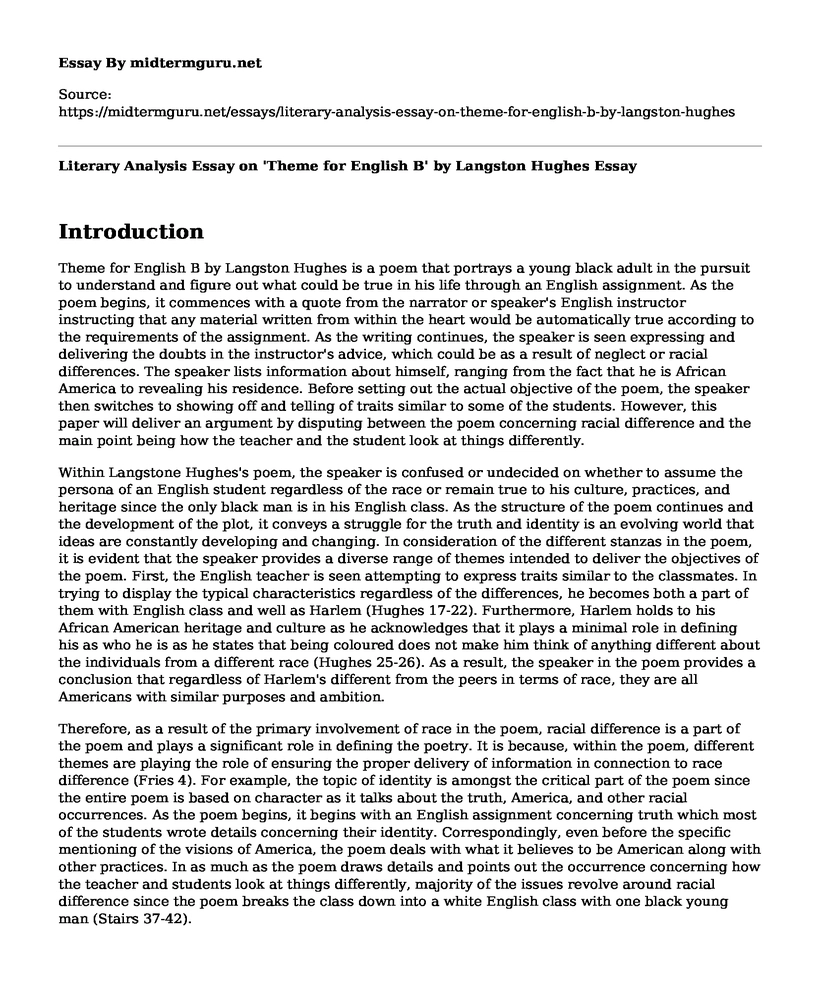Introduction
Theme for English B by Langston Hughes is a poem that portrays a young black adult in the pursuit to understand and figure out what could be true in his life through an English assignment. As the poem begins, it commences with a quote from the narrator or speaker's English instructor instructing that any material written from within the heart would be automatically true according to the requirements of the assignment. As the writing continues, the speaker is seen expressing and delivering the doubts in the instructor's advice, which could be as a result of neglect or racial differences. The speaker lists information about himself, ranging from the fact that he is African America to revealing his residence. Before setting out the actual objective of the poem, the speaker then switches to showing off and telling of traits similar to some of the students. However, this paper will deliver an argument by disputing between the poem concerning racial difference and the main point being how the teacher and the student look at things differently.
Within Langstone Hughes's poem, the speaker is confused or undecided on whether to assume the persona of an English student regardless of the race or remain true to his culture, practices, and heritage since the only black man is in his English class. As the structure of the poem continues and the development of the plot, it conveys a struggle for the truth and identity is an evolving world that ideas are constantly developing and changing. In consideration of the different stanzas in the poem, it is evident that the speaker provides a diverse range of themes intended to deliver the objectives of the poem. First, the English teacher is seen attempting to express traits similar to the classmates. In trying to display the typical characteristics regardless of the differences, he becomes both a part of them with English class and well as Harlem (Hughes 17-22). Furthermore, Harlem holds to his African American heritage and culture as he acknowledges that it plays a minimal role in defining his as who he is as he states that being coloured does not make him think of anything different about the individuals from a different race (Hughes 25-26). As a result, the speaker in the poem provides a conclusion that regardless of Harlem's different from the peers in terms of race, they are all Americans with similar purposes and ambition.
Therefore, as a result of the primary involvement of race in the poem, racial difference is a part of the poem and plays a significant role in defining the poetry. It is because, within the poem, different themes are playing the role of ensuring the proper delivery of information in connection to race difference (Fries 4). For example, the topic of identity is amongst the critical part of the poem since the entire poem is based on character as it talks about the truth, America, and other racial occurrences. As the poem begins, it begins with an English assignment concerning truth which most of the students wrote details concerning their identity. Correspondingly, even before the specific mentioning of the visions of America, the poem deals with what it believes to be American along with other practices. In as much as the poem draws details and points out the occurrence concerning how the teacher and students look at things differently, majority of the issues revolve around racial difference since the poem breaks the class down into a white English class with one black young man (Stairs 37-42).
Conclusion
In conclusion, the issue of racial difference forms a broad context of the poem. The character in the poem is different in terms of race. However, they do not consider the difference in racial occurrence but attempt to look at the similarities. For instance, as seen in line 37 to 38, Hughes writes, "As I learn from you, I guess you learn from me" (Hughes 37). Such an occurrence is an evident indication of the choices one can make regardless of race differences.
Works Cited
Fries, Peter H. "On the status of the theme in English: arguments from the discourse." Micro and macro connexity of texts 45 (1983).
Hughes, Langston. "Theme for English B." The poems of Langston Hughes (1951): 409-10.
Stairs, Andrea J. "Culturally responsive teaching: The Harlem Renaissance in an urban English class." English Journal (2007): 37-42.
Cite this page
Literary Analysis Essay on 'Theme for English B' by Langston Hughes. (2023, Jan 26). Retrieved from https://midtermguru.com/essays/literary-analysis-essay-on-theme-for-english-b-by-langston-hughes
If you are the original author of this essay and no longer wish to have it published on the midtermguru.com website, please click below to request its removal:
- Essay on The Tower of The Elephant By Robert E Howard
- Analysis of Emily Dickinsons Poetry
- Comparison of Two Heroes: Gilgamesh and Odyssey
- Film Critique Paper Example: The Kite Runner
- Literature Essay on Winter's Bone by Daniel Woodrell
- Critical Essay on Instances of Wisdom and Arrogance in 'Antigone'
- Compare And Contrast Essay on "Sleepy Hollow" And Tim Burton's Film







